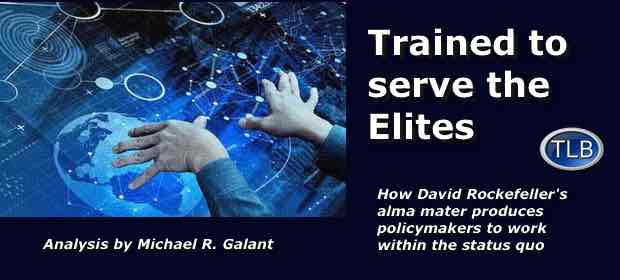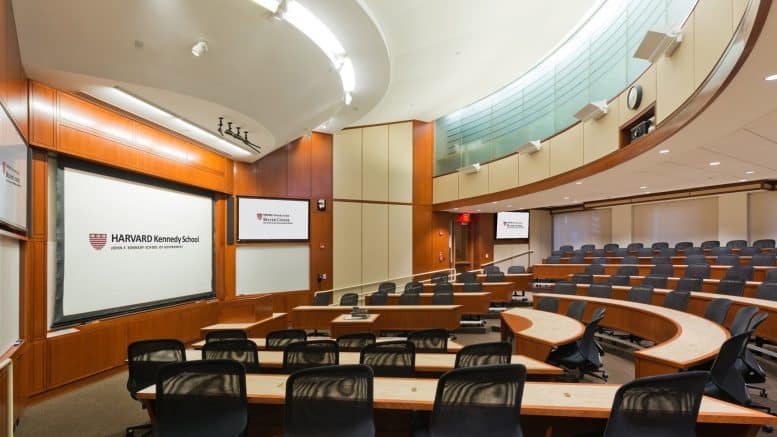
Exposed: Harvard’s Kennedy School Charged With Producing Technocrats
 Harvard Kennedy School
Harvard Kennedy SchoolTECHNOCRACY NEWS
Harvard Kennedy School for Public Policy is legendary in the world of academics. The problem is that it pumps out Technocrats, according to one student. He states that the curriculum is “designed to produce elite technocrats. If you are interested in effecting meaningful change in pursuit of a better society, the Kennedy School is not for you.” ⁃ TN Editor
The Perils of Technocracy at the Kennedy School
MICHAEL R. GALANT
As this year’s accepted students weigh the decision to commit to a Kennedy School education, they may recall the essay question that they answered in their application:
“The Harvard Kennedy School motto, echoing the President for whom the School is named, is ‘Ask what you can do.’ Please share with the Admissions Committee your plans to create positive change through your public leadership and service.”
We enter the Kennedy School asking what we can do to create positive change. We expect our education here to help. A piece of advice from a soon-to-be graduate: It won’t.
The Kennedy School curriculum is designed to produce elite technocrats. If you are interested in effecting meaningful change in pursuit of a better society, the Kennedy School is not for you.
The Kennedy School curriculum is based on a model of politics that occurs within the bounds of existing power relations. Policymaking, we learn, is the art of accepting the status quo and finding “solutions” within it. There is no critical examination of the systems that produce the problems in the first place and certainly no attempt to change them. Our job is to design top-down, incremental solutions that may provide some benefit at the margins.
Like the fish that doesn’t know what water is, the underlying model of politics at the Kennedy School is so ubiquitous that it is difficult to spot. We embody the technocratic mindset whenever we precondition policies on what is acceptable to those who already hold power. We do this when we plan to heal our cities through artificial intelligence and Google partnerships, or when we speak of race and gender only in terms of diversity hiring and representation at the top, or when we find all of our development answers in randomized controlled trials and social entrepreneurship, or when we exalt “big data” as the ultimate solution for local governments, or when we try to nudge our way to healthier living.
Innovation, data, and efficiency aren’t necessarily bad. The problem at the Kennedy School, and wherever technocracy predominates, is that it becomes perceived as the only legitimate solution, crowding out critical assessments of the deeper causes of problems and the potential for meaningful shifts in power. Why fight for redistribution when we can solve poverty with an app?
While marketing itself as apolitical, technocracy becomes guardian of the status quo. Unsurprisingly, a wealthy, powerful school trains alumni to serve the interests of the wealthy and powerful.
In a master of public policy student’s first year, more than a quarter of all required credits are reserved for statistics. The same for economics. Two requirements, on top of this, are dedicated to professional and managerial skills. And the MPP is considered less technical. Of the master of public administration in international development’s requirement-heavy curriculum, almost every class is economics or statistics.
In the spring policy analysis course, the MPP’s foundational training for the flagship skill of “policy analysis,” students are explicitly taught to design solutions that appeal to the existing arrangement of stakeholder power. Of the case studies carefully selected as aspirational models when I took the course, one sought solutions to climate change through disclosure of financial risks to investors. Another, an admittedly valuable set of voluntary guidelines on businesses and human rights, was accompanied by a lecture that displayed deep scorn not for rights-abusing businesses, but for the human rights activists who dared push for binding regulations. A third advocated determining rainforest land use through quantification of economic potential. When asked whether quantification would favor more powerful economic interests over the social and cultural needs of indigenous groups, the lecturer dismissed the question: Why would it?
Across all Kennedy School master’s programs, there is not a single required course, and very few on offer at all, that focus on contemporary, critical social perspectives: anthropology, sociology, cultural studies, media studies, gender studies, feminist theory, postcolonial theory, post-development theory, critical race theory, or queer theory. Rarer still are courses designed to prepare students to act on these critiques in pursuit of meaningful shifts in power. The few exceptions—electives taught by Kennedy School Professor Khalil G. Muhammad, senior lecturer Marshall L. Ganz ’64, lecturer Douglas A. Johnson, and HKS Professor Katheryn Sikkink, come to mind—prove that it is possible to incorporate critical perspectives into our coursework. The Kennedy School simply chooses not to.
************
Original article
ER recommends other articles by Technocracy News




